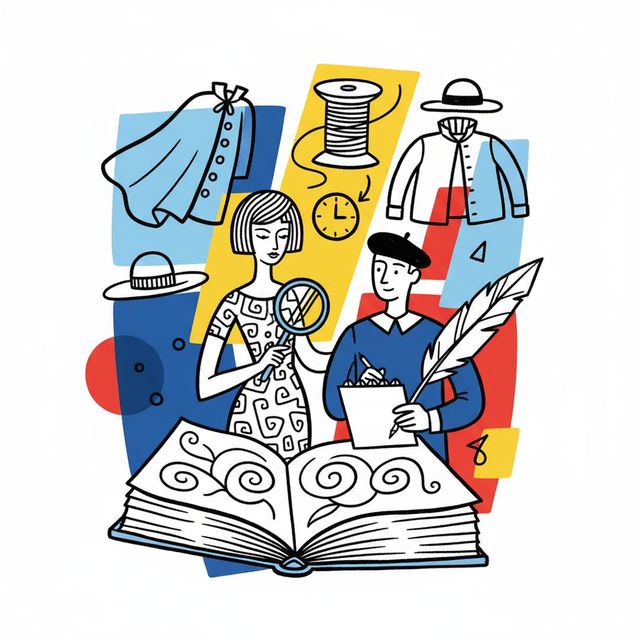Fashion Historian
Fashion Historians conduct research, write, and speak about the history of fashion. They may work in museums, archives, or universities, or they may be self-employed. Fashion Historians typically have a strong background in art history, history, and fashion theory. They must be able to conduct research, write clearly and concisely, and speak persuasively. Fashion Historians often work with fashion designers, curators, and other professionals in the fashion industry.
Educational Background
Fashion Historians typically have a bachelor's degree in art history, history, fashion design, or a related field. Some Fashion Historians also have a master's degree or PhD in fashion history or a related field. Fashion Historians who work in museums or archives may also have a degree in museum studies or archival science.
Skills
Fashion Historians need to have a strong foundation in art history, history, and fashion theory. They must also be able to conduct research, write clearly and concisely, and speak persuasively. Other skills that are helpful for Fashion Historians include:
- Knowledge of foreign languages
- Experience with digital databases and archives
- Ability to work independently and as part of a team
- Strong organizational and time management skills
- Attention to detail
- Creativity
- Passion for fashion
Tools and Equipment
Fashion Historians use a variety of tools and equipment to conduct their research and write their work. These tools and equipment may include:
- Computers
- Printers
- Scanners
- Digital cameras
- Research databases
- Archival materials
Career Growth
Fashion Historians can advance their careers by taking on leadership roles within their organizations. They may also become involved in teaching or research. Some Fashion Historians may also start their own businesses.
Transferable Skills
The skills that Fashion Historians develop can be transferred to a variety of other careers. These skills include:
- Research skills
- Writing skills
- Speaking skills
- Critical thinking skills
- Problem-solving skills
- Organizational skills
- Time management skills
- Attention to detail
- Creativity
- Passion for fashion
Day-to-Day
The day-to-day work of a Fashion Historian can vary depending on their job title and organization. However, some common tasks include:
- Conducting research on fashion history
- Writing articles, books, or other publications about fashion history
- Giving lectures or presentations about fashion history
- Curating fashion exhibitions
- Working with fashion designers, curators, and other professionals in the fashion industry
Challenges
Fashion Historians may face a number of challenges in their work. These challenges may include:
- The need to stay up-to-date on the latest fashion trends
- The difficulty of finding and accessing archival materials
- The need to balance academic research with the demands of the fashion industry
- The competition for jobs in the fashion industry
Projects
Fashion Historians may work on a variety of projects throughout their careers. These projects may include:
- Researching and writing a book about a particular fashion designer or era
- Curating a fashion exhibition
- Giving a lecture or presentation about fashion history
- Developing a new educational program about fashion history
- Starting a fashion blog or website
Personal Growth Opportunities
Fashion Historians have many opportunities for personal growth throughout their careers. These opportunities may include:
- Developing new research skills
- Improving writing and speaking skills
- Gaining a deeper understanding of fashion history
- Building relationships with other professionals in the fashion industry
- Starting a new business
Personality Traits and Personal Interests
Fashion Historians typically have the following personality traits and personal interests:
- Strong interest in fashion
- Good research skills
- Excellent writing and speaking skills
- Attention to detail
- Creativity
- Passion for learning
- Ability to work independently and as part of a team
Self-Guided Projects
There are a number of self-guided projects that students can complete to better prepare themselves for a career as a Fashion Historian. These projects may include:
- Researching a particular fashion designer or era
- Creating a fashion timeline
- Writing a fashion blog or website
- Curating a fashion exhibition
- Giving a lecture or presentation about fashion history
Online Courses
Online courses can be a helpful way to learn about fashion history and prepare for a career as a Fashion Historian. Online courses can provide students with the opportunity to learn from experts in the field, access archival materials, and develop their research and writing skills. Some of the skills and knowledge that students can gain from online courses include:
- A deeper understanding of fashion history
- Stronger research skills
- Improved writing and speaking skills
- Experience with digital databases and archives
- Knowledge of foreign languages
Online courses can be a helpful learning tool for students who are interested in pursuing a career as a Fashion Historian, but they are not a substitute for a traditional education. Students who are interested in becoming Fashion Historians should consider pursuing a bachelor's degree in art history, history, fashion design, or a related field.


